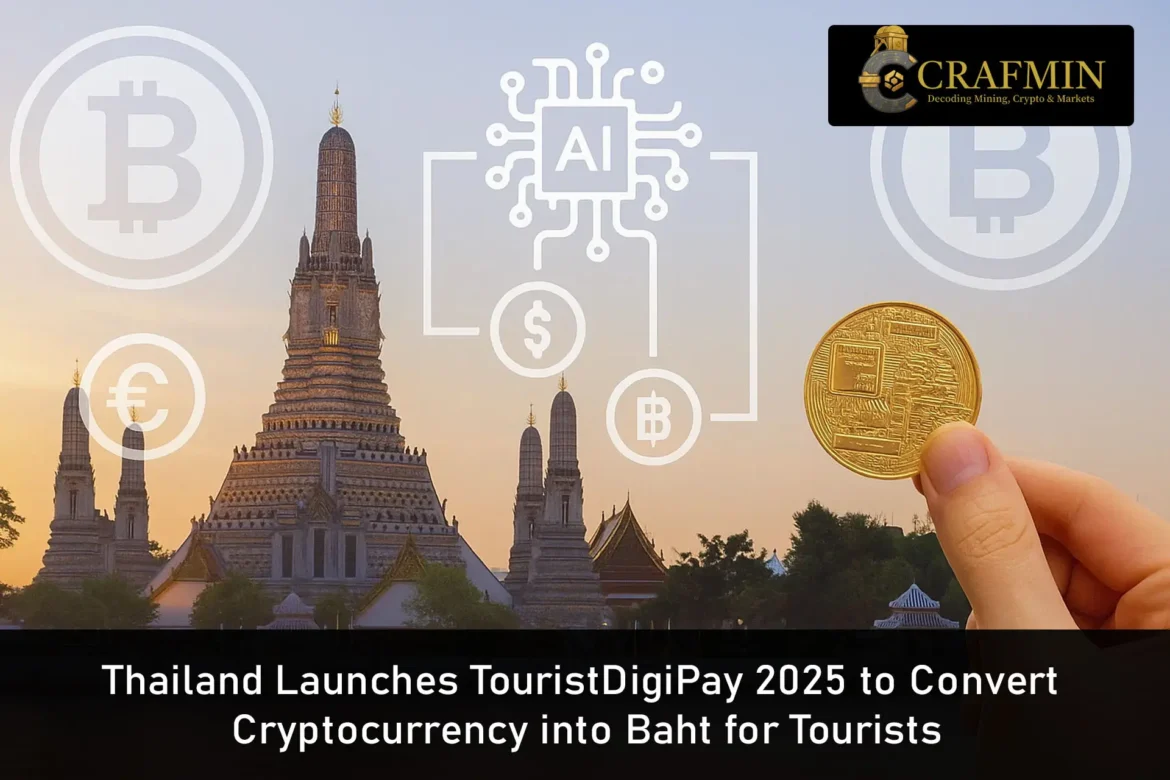Thailand has launched TouristDigiPay, a new program that allows foreign visitors to convert cryptocurrency into Thai baht for electronic payments. The new scheme was launched on August 18, 2025, with the aim of encouraging tourism while maintaining control over finances.
TouristDigiPay Introduction and Purpose
The program was launched formally by Deputy Prime Minister and Minister of Finance Pichai Chunhavajira, along with key financial regulators. It enables foreign tourists to spend cryptocurrency during their holiday by converting it into Thai baht under a controlled regime.
Thailand will launch the “TouristDigiPay” scheme on August 18, allowing foreign visitors to convert cryptocurrency into Thai baht for QR code payments. The program runs under a regulatory sandbox, requires strict KYC/AML checks, and sets monthly spending limits of 50,000–500,000…
— Wu Blockchain (@WuBlockchain) August 17, 2025
According to a post by Wu Blockchain on X, the program forms part of a regulatory sandbox that promotes innovation while having strict compliance rules. The scheme will assist in overcoming difficulties faced by the tourism sector, which has seen a decline in tourist numbers this year.
How the Scheme Works
Users who wish to use TouristDigiPay have to be registered with a licensed digital asset provider and an e-money service provider. Both of these organizations would fall under the supervision of the Bank of Thailand (BOT) and the Securities and Exchange Commission (SEC).
Once registered, tourists can convert cryptocurrency into baht, stored in a supervised Tourist Wallet. Payment is subsequently made using QR codes, which are accepted everywhere in Thailand. The system enables tourists to spend conveniently without merchants directly accepting crypto payments.
Spending Controls and Safeguards
The program also sets expenditure limits per month in order to protect financial safety. Merchants with a card acceptance device may obtain up to 500000 baht, but small enterprises cannot obtain more than 50000 baht. These restrictions strike a balance between cost-accessibility and limiting large expenditures.
Extraction of money during the visit of the tourist is prohibited. The money that a guest has not used can be withdrawn during the process of closing the Tourist Wallet. This limitation means that the system is actually limited to only tourism payments, and the possibility of misusing it is avoided.
Regulatory Oversight and Compliance
The Thailand Anti-Money Laundering Office (AMLO) places strict control on TouristDigiPay. All of them are required to go through Know Your Customer (KYC) and Anti-Money Laundering (AML) checks prior to the use of the facility. The measures deter illegal dealings and make the strategy compliant with international regulations in the financial field.
The compliance is ensured without jeopardizing convenience for tourists. By the interplay of regulation and balance, Thailand provides a sanctuary for cryptocurrency adoption in its tourism sector.
Spurring Tourism With Crypto Assets
The launch comes at a time when Thailand is experiencing declining tourist arrivals, particularly from East Asia and China. The government is seeking creative ways to receive visitors by introducing new forms of payment that will attract crypto-conscious travelers.
TouristDigiPay promotes this aim by removing conversion hurdles and providing a seamless payment process. Authorities believe that allowing tourists to spend digital currency directly will be a key driver for more spending and propel the overall economy.
Thailand’s Role in International Crypto Tourism
Globally, few countries have introduced programs specifically for tourists using cryptocurrency. With the launch of TouristDigiPay, Thailand becomes a leader in the regulated adoption of cryptocurrency in tourism.
The program would also enhance the country’s image of Thailand being a visionary nation. With the use of technological creativity and regulatory assurances, it is a system that other countries will exercise in the future.

